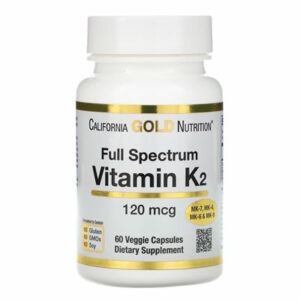The basic concept of vitamin K
Vitamin K is a vitamin found in green leafy vegetables, broccoli, and cabbage, and is a vitamin that helps blood clot.
There are several different types of vitamin K: The main products available in North America are vitamin K1 (Phytonadione, also known as phylloquinone) and vitamin K2 (Menaquinone, also known as menadione).
Generally speaking, vitamin K1 is preferred because of its low toxicity, fast effect, strong potency, and good effect on specific symptoms.
Vitamin K plays a major role in the coagulation function of the body, so when patients are given too many anticoagulant drugs, vitamin K can be used to reverse the effect of anticoagulants.
- It can prevent blood coagulation problems in newborns who lack vitamin K and can also be used to treat bleeding problems caused by drugs such as Salicylates, Sulfonamides, Quinine, Quinidine, or Antibiotics.
- It can also be used to prevent and treat Osteoporosis and soothe an itching often caused by bile cirrhosis. Oral vitamin K2 is generally used to treat osteoporosis, bone loss due to steroids, and to reduce total cholesterol in hemodialysis patients.
- It can be used topically on the skin to remove spider veins, bruises, scars, stretch marks, and burn.
- It can also be used to treat acne rosacea (Rosacea), a skin symptom that causes redness and acne on the face. Vitamin K is used after surgery to accelerate skin healing and reduce bruising and swelling.
In addition to knowing that vitamin K has blood coagulation function, researchers suggest that the intake of vitamin K should be increased in the diet, but still refuse to increase the intake significantly, because there are still not enough research results to support a substantial increase in the recommended amount of vitamin K.
The principle of vitamin K
At present, there is not enough research on the efficacy of vitamin K. Please discuss further information with your doctor.
However, vitamin K is now known to be an indispensable vitamin for blood clotting and other important mechanisms.
Precautions
If you have the following situations, please consult your doctor or pharmacist before use:
- You are pregnant or breastfeeding: because when you are pregnant or breastfeeding, you should only take medicines as directed by your doctor.
- You are taking other medicines.
- You are allergic to any substance of vitamin K, other medicines, or other herbs.
- You currently have other diseases, conditions, or conditions.
- You have any type of allergies, such as food, dye, preservatives, or animal allergies.
Compared with the regulation of medicines, the regulation of herbal medicines is less strict, and more research is needed to prove its safety.
Before use, please ensure that the benefits outweigh the risks. It is recommended to consult an herbalist or physician for more information.
Is it safe to use vitamin K
For most people, it is safe to take vitamin K orally or intravenously.
Special considerations
- Pregnancy or breastfeeding: The recommended daily dosage of vitamin K is generally safe for women who are pregnant or breastfeeding. However, do not consume more than the recommended dosage without the advice of a physician or pharmacist.
- Children: It is safe to use vitamin K1 by oral or moderate injection.
- Diabetes: It is known that vitamin K1 may lower blood sugar. If you have diabetes and use vitamin K1 at the same time, you should pay close attention to the blood sugar level.
- Kidney disease: If you receive hemodialysis treatment for kidney disease, too much vitamin K may be harmful to the body.
- Liver disease: Vitamin K has no effect on the treatment of coagulation problems caused by severe liver disease, but excessively high doses of vitamin K may worsen the coagulation problems of these patients.
- Decreased bile secretion: If patients with reduced bile use vitamin K, additional bile salts may be needed to ensure vitamin K is absorbed.
Potential side effects of using vitamin K
When ingesting the recommended daily amount of vitamin K, most people will not have any side effects, but if you have any doubts about side effects, please consult your doctor.
Potential interactions with vitamin K
Vitamin K may interact with your current medication or physical condition, so you should consult your physician before using this medicine. Products that interact with vitamin K include:
Warfarin: Vitamin K is used to help blood clotting, and warfarin is used to slow blood clotting. Vitamin K may reduce the effect of warfarin. Be sure to regularly test blood to adjust the dosage of warfarin.
The recommended dosage of vitamin K
The following information is not a medical diagnosis, please consult a physician or herbalist before using.
What is the general usage of vitamin K
oral:
- Used for bleeding defects such as hypoprothrombinemia (Hypoprothrombinemia): 2.5-25 mg of vitamin K1.
- Used to neutralize excessive anticoagulants: generally use about 1 to 5 mg of vitamin K; however, the exact amount needs to be determined by a test called International Normalized Ratio (INR).
There is currently insufficient scientific evidence to formulate the exact recommended daily intake of Vitamin K (Recommended Dietary Allowances, RDAs). Instead, it is replaced by Adequate Intake (AI), which are:
- Infants aged 0-6 months: 2 micrograms.
- Infants from 6 to 12 months: 2.5 micrograms.
- Children 1 to 3 years old: 30 micrograms.
- Children 4-8 years old: 55 mcg.
- Children 9 to 13 years old: 60 micrograms.
- Adolescents 14 to 18 years old (including pregnant or breastfeeding): 75 mcg.
- Men over 19 years old: 120 mcg.
- Women over 19 years old (including pregnant or breastfeeding): 90 micrograms.
The dosage of vitamin K varies according to each person’s age, physical condition and other health conditions, and nutritional supplements are not always safe. Be sure to consult your doctor or pharmacist about your optimal dosage.
Types of Vitamin K products
- Soft capsule
- Tablets
Where can I buy the best Vitamin K supplements?
In recent years, food safety problems in various countries have exploded, and it is not healthy but black-hearted products that everyone spends on. Therefore, European and American products with relatively strict quality control have become popular products.
And iHerb.com is a large-scale medical cosmetics e-commerce company in the United States. It has a high satisfaction rate of 97% in the evaluation of Google customers. It provides global home delivery so that you can buy it without risking buying fakes through purchasing high-quality health products.

